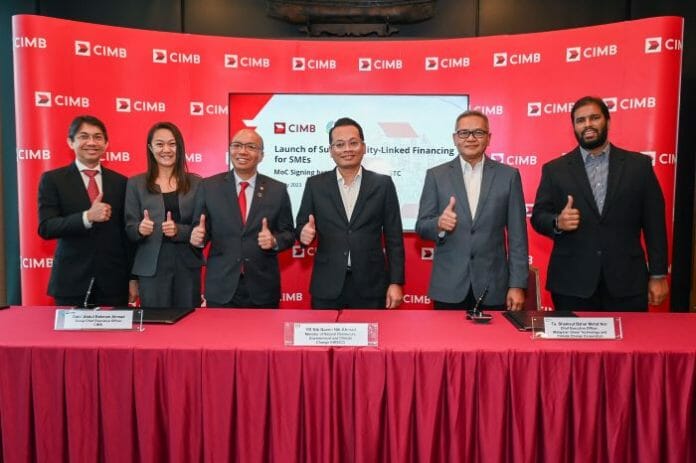CIMB Bank Berhad has enhanced its GreenBizReady proposition with the launch of Sustainability-Linked Financing for small and medium enterprises with a total allocation of RM3 billion through 2030 for the Programme.
The SLF aims to incentivise SMEs to achieve credible greenhouse gas emission reduction targets through attractive financing rebates of up to 0.50% per annum, as they secure financing to meet their capital or expansion needs. Once sustainability performance targets have been agreed with CIMB, SMEs only need to input data such as energy and fuel consumption into
Malaysian Green Technology and Climate Change Corporation’s Low Carbon Operating System platform, a simple and user-friendly web-based tool. Additionally, by combining the SLF with Bank Negara Malaysia’s Low Carbon Transition Facility SMEs can also benefit from better financing rates.
The SLF Programme is the latest extension of CIMB’s award-winning GreenBizReady proposition that was launched in 2021 as a complimentary one-stop sustainability solution for SMEs. Through GreenBizReady, CIMB helps SMEs to achieve their sustainability targets through training and advisory services, as well as matching them with suppliers and associates.
Through LCOS, MGTC envisions a greener, more resilient country, where businesses, communities, and policymakers work hand in hand to create a legacy of environmental stewardship, leaving a lasting impact for generations to come,” he added.
SLFs are a popular transition finance mechanism, but are usually highly bespoke and costly due to verification requirements to meet global standards. CIMB’s SLF Programme helps SMEs to overcome these long-standing challenges of measurement and verification of sustainability targets in a holistic and cost-effective manner, providing access to incentives that have generally only been available to corporates in the past. The SLF is also aligned with the globally recognised Loan Market Association’s Sustainability-Linked Loan Principles.
Besides reducing negative environmental impact, the Programme also aims to ensure SMEs’ business resilience and continued access to export markets by improving their sustainability performance. This will help them to adapt to rapid market and regulatory developments such as the EU Carbon Border Adjustment Mechanism, upcoming local regulations and the transition towards sustainable supply chains within the global economy.









